#Jarrow March
Explore tagged Tumblr posts
Text
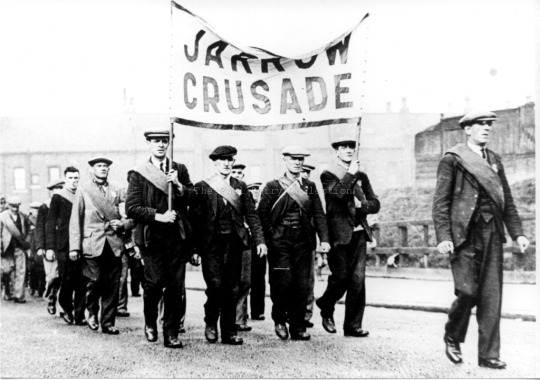
Areas that relied largely upon heavy industry, like the Northeast of England, were hit particularly hard by the Great Depression. On the southern bank of the River Tyne, Jarrow was just one of many industrial communities ravaged by unemployment, poverty, disease and starvation in the 1930s. Meanwhile, the National Coalition Government under Conservative Prime Minister, Stanley Baldwin, appeared to be looking the other way.
'One Nation' Conservatism had seen Baldwin steer the Tory ideology toward a much more compassionate, inclusive and interventionist position, at least in theory. Nineteenth Century Prime Minister Benjamin Disraeli had contended that the divide between rich and poor had rendered Britain 'two nations', between which there was 'no intercourse and no sympathy'.
In a speech in 1924, Baldwin said;
"…We stand for the union of those two nations of which Disraeli spoke two generations ago: union among our own people to make one nation of our own people at home which, if secured, nothing else matters in the world..."
According to Conservative Historian, Lord Alistair Lexden;
"…Tory policy was reshaped to advance the cause of 'One Nation'. Social reform became the Party’s dominant preoccupation for the first time in its history. The Conservative Party, Baldwin declared at the 1929 election, regards the prosperity of trade and industry, not as an end in itself, but as a means to improve the condition of the people…"
In 1986, a Jarrow resident during this period recalled to the BBC;
"…Pathetic. The Jarrow of those days was a filthy, dirty, fallen down consumptive area in which the infantile death rate was the highest in the country, and TB was a general condition…"
Jarrow Labour MP Ellen Wilkinson later wrote;
"…There was no work. No one had a job except a few railwaymen, officials, the workers in the co-operative stores, and a few workmen who went out of the town…The plain fact is that if people have to live and bear and bring up their children in bad houses on too little food, their resistance to disease is lowered and they die before they should…"
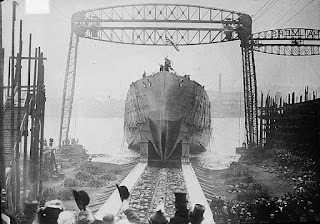
Palmer’s Shipyard, the principal source of employment since 1851, had closed down in 1934. Government unemployment benefits in those days lasted six months, after which responsibility was handed to the Unemployment Assistance Board, from which any tangible support was difficult to access and ultimately far from adequate. Eligibility was also subject to the controversial Means Test, first introduced in 1931. This meant that the combined wages and assets of all members of the household were taken into account when deciding whether or not individual unemployment relief should be forthcoming. In the context of the time, this was particularly humiliating for unemployed men who saw it as their duty to be the family provider.
Facing indifference from Westminster, the local Borough Council initiated a non-partisan campaign to try to bring employment, in the form of a new steelworks, back to the area. Two hundred unemployed men, selected from a pool of around 1400 volunteers, would march more than 280 miles to London to petition the government to establish new industries.
The marchers set off at 11 am on October 5th, 1936. As The Manchester Guardian reported, it wasn’t a hunger march, but a protest march. This was an important distinction in the context of the time, as the hunger march movement was seen as a communist initiative, one short step away from revolution, and a movement from which the mainstream Labour Party was keen to keep its distance. The Guardian also pointed out that at that time, less than 15% of the eligible Jarrow workforce was actually in work.
The Manchester Guardian;
"…There is no political aspect to this march. It is simply the town of Jarrow saying send us work. In the ranks of the marchers are Labour men, Liberals, Tories, and one or two Communists, but you cannot tell who's who..."
"...With the marchers goes, prominently carried, the Jarrow petition for work, a huge book with about 12,000 signatures, which Miss Ellen Wilkinson, MP for Jarrow, is to present at the bar of the House of Commons on November 4th..."
One marcher later recalled to the BBC, in 1977;
"…The spirit of the men was such that we were expecting something. We were expecting to prove to the capital, at that time, that here’s men from Jarrow. The spirit they had shown all the way down…Here we are, we want work and we are going to put our case that we must have work for the benefit of our wives and children…"
The marchers reached London by the end of October. A rally was held in Hyde Park, followed subsequently by the official presentation of the petition to Parliament by Ellen Wilkinson MP. The government remained unmoved, and there proved to be little or no immediate effect on economic or industrial policy. The men returned home by train, courtesy of donated tickets.
According to the UK National Archives;
"...To add insult to injury, the Unemployment Assistance Board officials in Jarrow docked the dole of the marchers because they had not been available for work. After the Jarrow March the Cabinet resolved to convince organisers that marches were unhelpful and caused unnecessary hardship to those taking part..."
Other reports suggest that the Cabinet's attitude was more about deterring any future protest marches, rather than concern for the marchers' welfare. Even the Labour Party itself was, at best, lukewarm in its support. Ellen Wilkinson had addressed their Edinburgh conference on the issue of Jarrow, but had found the agenda dominated by discussions of the Spanish Civil War and issues surrounding rearmament. There was even criticism of the idea of the march itself, and the physical burden it placed on unemployed and starving men.

Marcher Sam Rowland suggested that while the majority of politicians seemed unconcerned, public opinion was markedly different;
"…If the march achieved anything…it made the condition and lives of people a factor that should always be brought into consideration at the top level… and not left to work out their own salvation…"
The Guardian, BBC News and multiple other sources name the last surviving Jarrow Marcher as Con Shiels, who died in 2012, and who had felt that the march had made 'not one hap’orth of difference'.
For some additional context on this, @robbielewis has a fascinating article on Con Whalen, who passed away in 2003. He was the last surviving marcher who had completed the march in its entirety.

https://www.tumblr.com/robbielewis/716998502772785152/cornelius-whalen-the-last-jarrow-marcher?source=share
The next general election was held nearly a decade later, in 1945, as World War Two was coming to an end. Memories of the Depression era National Government and the desperate times of the interwar years would be a key factor in the landslide victory for the Labour Party.
References include BBC News, Liverpool Echo, Manchester Guardian archives, Spartacus Educational, Lord Lexden (Official Historian of the Conservative Party) (Website), BBC Radio 4 - Great Lives (Ellen Wilkinson), BBC Witness -The Great Depression and The Jarrow March, BBC History-Referencing Ellen Wilkinson’s The Town that was Murdered
#social history#uk politics#working class history#social justice#uk government#human rights#history#jarrow march#industrial history#industrial heritage#uk history#british culture#jarrow crusade#tyneside
37 notes
·
View notes
Text
The Jarrow March
On this date in 1936, the Jarrow march began. With the marchers pretty much from the star was a stray Labrador called Paddy. At first the marchers thought the Dog would soon wander off, but after about five miles, realised he was going to stick with them, so they took good care of him as they went.
10 things you might not know about the Jarrow March:
0 notes
Text
In October 1936, Ellen Wilkinson led 200 unemployed men on a march from the town of Jarrow in Tyneside, north-east England. Eighty per cent of the workforce in the steel and shipyard town were unemployed; child mortality was double the national average. The unemployed men marched nearly 300 miles to the House of Commons, with a 12,000-name petition, begging for help.

Official trade unions refused to support the march, and the Prime Minister Stanley Baldwin would not meet them. After the marchers delivered the petition, it was promptly lost – the matter was not debated in the Houses of Parliament, and the government offered no assistance. It was a dramatic demonstration of the indifference of the wealthy men and women in government to the want and despair of the working classes.
"Normal Women: 900 Years of Making History" - Philippa Gregory
#book quotes#normal women#philippa gregory#nonfiction#october#30s#1930s#20th century#ellen wilkinson#unemployed#marching#jarrow#tyneside#england#steel workers#shipyard#child mortality#house of commons#petition#demonstration#protest#prime minister#stanley baldwin#houses of parliament#debate#assistance#indifference#apathy#classism#class divide
2 notes
·
View notes
Text
Events 10.5 (before 1950)
610 – Heraclius arrives at Constantinople, kills Byzantine Emperor Phocas, and becomes emperor. 816 – King Louis the Pious is crowned emperor of the Holy Roman Empire by the Pope. 869 – The Fourth Council of Constantinople is convened to depose patriarch Photios I. 1143 – With the signing of the Treaty of Zamora, King Alfonso VII of León and Castile recognises Portugal as a Kingdom. 1450 – Louis IX, Duke of Bavaria expels Jews from his jurisdiction. 1607 – Assassins attempt to kill Venetian statesman and scientist Paolo Sarpi. 1789 – French Revolution: The Women's March on Versailles effectively terminates royal authority. 1813 – War of 1812: The Army of the Northwest defeats a British and Native Canadian force threatening Detroit. 1838 – The Killough massacre in east Texas sees eighteen Texian settlers either killed or kidnapped. 1869 – The Saxby Gale devastates the Bay of Fundy region in Canada. 1869 – The Eastman tunnel, in Minnesota, United States, collapses during construction, causing a landslide that nearly destroys St. Anthony Falls. 1877 – The Nez Perce War in the northwestern United States comes to an end. 1900 – Peace congress in Paris condemns British policy in South Africa and asserts Boer Republic's right to self-determination. 1905 – The Wright brothers pilot the Wright Flyer III in a new world record flight of 24 miles in 39 minutes. 1910 – In a revolution in Portugal the monarchy is overthrown and a republic is declared. 1911 – The Kowloon–Canton Railway commences service. 1914 – World War I: An aircraft successfully destroys another aircraft with gunfire for the first time. 1921 – The World Series is the first to be broadcast on radio. 1930 – British airship R101 crashes in France en route to India on its maiden voyage killing 48 people. 1931 – Clyde Edward Pangborn and Hugh Herndon,Jr. make the first nonstop flight across the Pacific Ocean in the plane Miss Veedol. 1936 – The Jarrow March sets off for London. 1938 – Holocaust: In Nazi Germany, Jews' passports are invalidated. 1943 – World War II: Battle of the Pacific: Ninety-eight American POWs are executed by Japanese forces on Wake Island. 1944 – The Provisional Government of the French Republic enfranchises women. 1945 – A six-month strike by Hollywood set decorators turns into a bloody riot at the gates of the Warner Brothers studio. 1947 – President Truman makes the first televised Oval Office address.
0 notes
Text
'VIEWS FROM THE EDGE' - w/c 30th September 2024
Dasha ‘Bye Bye Bye’
The Cathodes ‘Bye Bye Love’
Jethro Tull ‘Living In The Past’
Mickey Mouse Club ‘Mickey Mouse March’
Lucy Spraggan ‘Run’
Montrose ‘Bad Motor Scooter’
Public Service Broadcasting ‘Sputnik’
Cockersdale ‘Jarrow Song’
Killian Scott ‘Eurydice (from Netflix series ‘Kaos’)’
Blondie ‘Picture This’
Neocracy ‘Revenge’
Neocracy ‘Guilt’
Gavinco ‘Expect The Unexpected’
Fereshta ‘Global Nation’
Gracyn ‘Let Me Be’
No Parking For Caravans ‘Let It Be Real’
Cheryl Lynn ‘Got To Be Real
Simple Minds ‘Real Life’
Florida Georgia Line ‘Simple’
India Arie & Jools Holland ‘Georgia On My Mind’
Auburn ‘Indian Summer’
BandMaid ‘Summer Drive’
Marla Mase ‘All Fall Short’
Sassyhiya ‘Boat Called Predator’
New York Dolls ‘Personality Crisis’
The Vienna Academy Chorus with The Vienna State Opera Orchestra conducted by Sir Adrian Boult ‘Holst: The Planets – ‘Uranus, The Magician’
Saraswati ‘Magic In My Everyday’
Kala Chng ‘The Truth’
0 notes
Link
0 notes
Text
Anthony's Stupid Daily Blog (581): Thu 19th Oct 2023
I know the situation in Gaza is terrible but I think the people there can take solace in the fact that James Corden hasn't patronized them by doing a cold open on his chat show saying how sad the whole thing has made him. I checked out last night's Dynamite. The main talking point of the show was Sting announcing he’ll retire at AEW Revolution 2024 which traditionally happens in March so we have six more months of The Icon before he hangs it up for good. Sting was my favourite wrestler as a kid so I suppose I should be thankful that he's been a constant presense in my wrestling fandom ever since I first started watching it. I’m glad he’s getting to go out on his own terms because his WWE run was a complete dud and even though he obviously can't do the things he used to 20 years ago and he can literally only do the bare minimum now he's still the master of getting a pop from the crowd even if that means coming in for key spots while letting Darby Allin do all the heavy lifting. Even though he won't be wrestling any more I hope he sticks around in a managerial or authoritative role because he could still have a lot to offer the up and coming wrestlers. I don't know what Sting has planned for his final six months in wrestling but hopefully he doesn't go to crazy with the dives and we get treated to some dream matches between now and the final showtime. I went to Newcastle for my first proper session with the chiropractor today. They made me watch a video all about holistic healing and medicine before the session started which I rolled my eyes at. Chiropractic definitely works but what bugs me is how they try to postulate the reason that it works is because of magic an this energy that we have inside of us that isn't measurable or really provable in any way but it's definitely there. It's the same with meditation, that obviously works but it's sitting with your eyes closed and breathing gently, OF COURSE you're going to feel more relaxed by the end of it why attach magic to the process? Because my operation took place in my upper neck my chiropractor has to be careful when administering the cracks that you normally get during a rearrangement. When it came to relieving pressure on my upper neck she used one of those mini pogo stick things instead of cracking my neck with her hands. When I went to sign up with the chiropractor in Jarrow he told me that he would ONLY be using the mini pogo stick thing (I'm sure it has a proper name, if the bit of skin between your arsehole and your ballbag has a name then this thing probably does) which put me off going to see this guy. This session wasn't without the cracks though as she pushed down on my lower to mid back and it made some major cracking noises. The right side already feels like there’s less resistance whenever I try to touch my ear with my shoulder but as with the physiotherapy this might just be wishful thinking but I will reserve judgement until after I've had a few sessions to see if they really do start to relieve the discomfort.
0 notes
Text

The Jarrow Crusaders.
Men from Jarrow, England took place in an organised protest from 5-31 October, where they marched to London (290 miles) to protest unemployment and poverty in their town, following the closure of Palmer's Shipyard, which was the town's main source of employment.
Their local MP Ellen Wilkinson (otherwise known as Red Ellen) presented a petition with 11,000 signatures to Parliament requesting work for the town's residents.
The petition was denied and the Jarrow Marchers were given nothing but their train fare home.
"In Jarrow, landscape and memory have fused together, just as the red hot rivets once fastened great sheets of steel in Palmer's Yard." - Matt Perry.
1 note
·
View note
Text
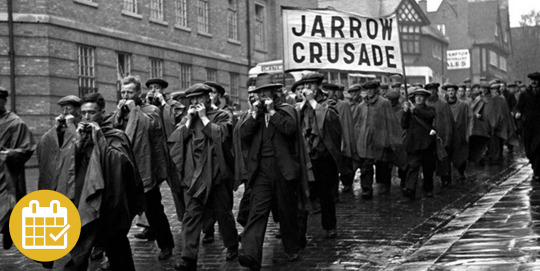
On October 5th 1936, 200 unemployed men from Jarrow in the northeast of England set off on a 282-mile march to London. At the time, Jarrow was one of the largest shipbuilding centres in the country. The town and its population were hit hard during the 1930’s having failed to recover from the Great Depression. The town’s Member of Parliament said “Jarrow has been murdered by the struggles of our time.”
The men marched to raise awareness of the poverty their families were experiencing and the government’s lack of response. The Jarrow March massively contributed to the social reforms that would take place in health, education, employment and social security.
The society that Jesus came into 2,000 years ago, was divided along social, religious and political lines. It is impossible to read the accounts of his words and actions without concluding he was a fierce defender of the poor and underprivileged. On one occasion, he entered the religious HQ upending the tables of the money traders. Among other things, they were selling religion to the very people Jesus came to save. He still lines up alongside the downtrodden.
0 notes
Text
21st November 2022 (1)
If you want assessment of the current political regime in this country then this TikTok account is able to provide it. The pieces of news analysis which are long on description of what the country has faced since the pandemic, it is long on analysis of conservative policy (I will add my own bias here and say that there is little or nothing in conservative policy I agree with, there is nothing in what they did in the Jeremy Hunt autumn statement that I don’t seriously believe was not written at the behest of the big banks and big industry), however whilst these people making the TikTok’s are not saying is what to do. All the Autumn Statement really did was to put the situation further down the road, not what to do. I have an answer, and its not to strike and then say well we will provide cover. The answer is an old fashioned general strike where all the working people come out on the streets and say enough is enough. I am convinced that if the situation becomes much worse over the next years we will once again see something akin to the Jarrow Marches where the poor, the hungry the disposed will march from there own particular Jarrows to say to the government you have tried these policies and they failed why continue repeating them. Because behind all the government of what ever colour there is an agreement between the people and government that they work for us and we give our consent for this to happen. And we now withdraw that consent. I want to say we are being ruled by a government, who lied to the public, by a group of politicians who seem incapable of keeping there trousers on, and by a group of politicians who hold no one to account for there words actions or even deeds. Then say to the public when they are caught out sorry it won’t happen again yet continue in exactly the same way.
0 notes
Text
today's featured article on Wikipedia is the Jarrow March
today's featured article on Wikipedia is the snowy plover
230 notes
·
View notes
Text
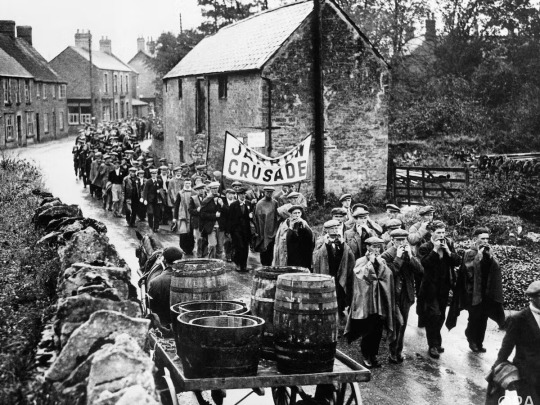
On October 6th, 1936, 200 selected marchers out of 1400 volunteers set off from Jarrow, to walk 280 miles to London. They took with them a petition with 12 000 signatures, urging the National Government of Stanley Baldwin to assist with the establishment of a new steelworks to mitigate Tyneside unemployment, which had reached 70 to 85% since the closure of Palmer's Shipyard. Jarrow was described as a 'filthy, dirty, fallen down consumptive area in which the infantile death rate was the highest in the country, and TB was a general condition'.
Labour MP Ellen Wilkinson wrote;
"…There was no work. No one had a job except a few railwaymen, officials, the workers in the co-operative stores, and a few workmen who went out of the town…The plain fact is that if people have to live and bear and bring up their children in bad houses on too little food, their resistance to disease is lowered and they die before they should…"
The Manchester Guardian reported;
"…There is no political aspect to this march. It is simply the town of Jarrow saying send us work. In the ranks of the marchers are Labour men, Liberals, Tories, and one or two Communists, but you cannot tell who's who..."
It wasn't unreasonable to think that Prime Minister Stanley Baldwin might have been receptive. He had previously spoken on the merits of 'one nation' compassionate conservatism, and that 'The Conservative Party regards the prosperity of trade and industry, not as an end in itself, but as a means to improve the condition of the people'.
The marchers reached London after 22 days on the road. A rally was held in Hyde Park, followed by the official presentation of the petition to parliament by Ellen Wilkinson MP. The government was unmoved, and marchers returned home by train, courtesy of donated tickets.
There was concern in parliament generally about the hunger march movement, with fears over revolutionary sentiment. Not even the Labour Party were unanimously supportive, with the Spanish Civil War and rearmament dominating the debate at that point.
The next general election was held nearly a decade later, in 1945, as World War Two was coming to an end. Memories of the Baldwin and Chamberlain National Governments and the desperate times of the interwar years would be a key factor in the landslide victory for the Labour Party, with their 'cradle to grave' Welfare State manifesto.
According to the BBC World Service, the last surviving participant of the march died in 2003. The Guardian, BBC News and multiple other sources however, name the last survivor as Con Shiels, who died in 2012, and who had felt that the march had made not one hap’orth of difference.
#jarrow march#social history#working class history#social justice#human rights#society#unemployment#democracy#uk politics#uk history#great depression#tyneside
32 notes
·
View notes
Text
"Change will not come from above" @ViragoBooks #GeneralStrike #JarrowMarch
“Change will not come from above” @ViragoBooks #GeneralStrike #JarrowMarch

Clash by Ellen Wilkinson
So…. I’ve managed quite well with #WITmonth during August I feel – three titles so far – but needless to say I am *not* sticking with my plans… I had wanted to read at least one Virago this month and had pencilled in “A Fine of Two Hundred Francs” by Elsa Triolet. Not only is it a book I’ve intended to read for ages, but it would have also fitted in with WITmonth and…
View On WordPress
1 note
·
View note
Text
Events 10.5
610 – Heraclius arrives at Constantinople, kills Byzantine Emperor Phocas, and becomes emperor. 816 – King Louis the Pious is crowned emperor of the Holy Roman Empire by the Pope. 869 – The Fourth Council of Constantinople is convened to depose patriarch Photios I. 1143 – With the signing of the Treaty of Zamora, King Alfonso VII of León and Castile recognises Portugal as a Kingdom. 1450 – Louis IX, Duke of Bavaria expels Jews from his jurisdiction. 1607 – Assassins attempt to kill Venetian statesman and scientist Paolo Sarpi. 1789 – French Revolution: The Women's March on Versailles effectively terminates royal authority. 1813 – War of 1812: The Army of the Northwest defeats a British and Native Canadian force threatening Detroit. 1838 – The Killough massacre in east Texas sees eighteen Texian settlers either killed or kidnapped. 1869 – The Saxby Gale devastates the Bay of Fundy region in Canada. 1869 – The Eastman tunnel, in Minnesota, United States, collapses during construction, causing a landslide that nearly destroys St. Anthony Falls. 1877 – The Nez Perce War in the northwestern United States comes to an end. 1900 – Peace congress in Paris condemns British policy in South Africa and asserts Boer Republic's right to self-determination. 1905 – The Wright brothers pilot the Wright Flyer III in a new world record flight of 24 miles in 39 minutes. 1910 – In a revolution in Portugal the monarchy is overthrown and a republic is declared. 1911 – The Kowloon–Canton Railway commences service. 1914 – World War I: An aircraft successfully destroys another aircraft with gunfire for the first time. 1921 – The World Series is the first to be broadcast on radio. 1930 – British airship R101 crashes in France en route to India on its maiden voyage killing 48 people. 1936 – The Jarrow March sets off for London. 1938 – In Nazi Germany, Jews' passports are invalidated. 1943 – Ninety-eight American POWs are executed by Japanese forces on Wake Island. 1944 – The Provisional Government of the French Republic enfranchises women. 1945 – A six-month strike by Hollywood set decorators turns into a bloody riot at the gates of the Warner Brothers studio. 1947 – President Truman makes the first televised Oval Office address. 1962 – The first of the James Bond film series, based on the novels by Ian Fleming, Dr. No, is released in Britain. 1962 – The first Beatles single "Love Me Do" is released in Britain. 1963 – The United States suspends the Commercial Import Program in response to repression of the Buddhist majority by the regime of President Ngo Dinh Diem. 1966 – A reactor at the Enrico Fermi Nuclear Generating Station near Detroit suffers a partial meltdown. 1968 – A Northern Ireland Civil Rights Association march in Derry is violently suppressed by police. 1970 – The Public Broadcasting Service (PBS) is founded. 1970 – The British Trade Commissioner, James Cross, is kidnapped by members of the Front de libération du Québec, triggering the October Crisis in Canada. 1974 – Bombs planted by the PIRA in pubs in Guildford kill four British soldiers and one civilian. 1982 – Tylenol products are recalled after bottles in Chicago laced with cyanide cause seven deaths. 1984 – Marc Garneau becomes the first Canadian in space. 1986 – Mordechai Vanunu's story in The Sunday Times reveals Israel's secret nuclear weapons. 1988 – A Chilean opposition coalition defeats Augusto Pinochet in his re-election attempt. 1990 – After 150 years The Herald newspaper in Melbourne, Australia, is published for the last time as a separate newspaper. 1991 – An Indonesian Air Force C-130 crash kills 135 people. 1999 – The Ladbroke Grove rail crash in West London kills 31 people. 2000 – Mass demonstrations in Serbia force the resignation of Slobodan Milošević. 2011 – In the Mekong River massacre, two Chinese cargo boats are hijacked and 13 crew members murdered.
0 notes
Photo

The Arrival of the Jarrow March [5–31 October 1936] in London, viewed from an Interior by Thomas Cantrell Dugdale [1880–1952]
426 notes
·
View notes
Text
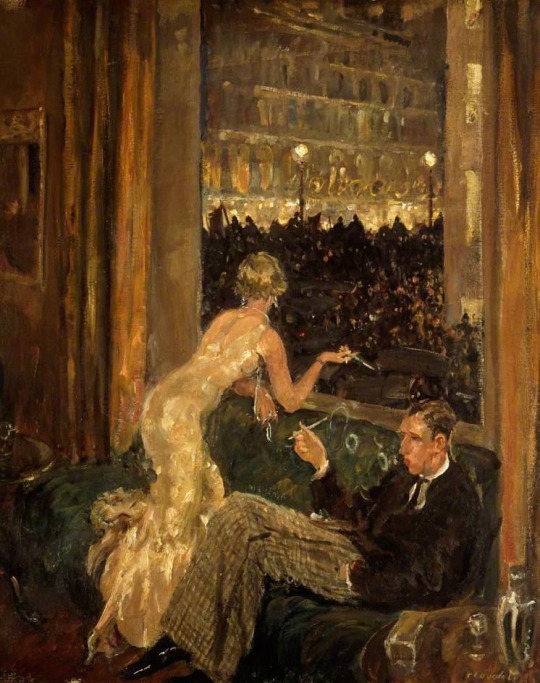
6 notes
·
View notes